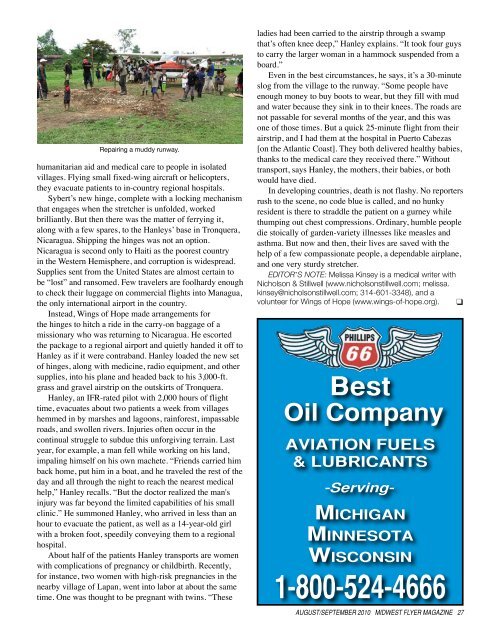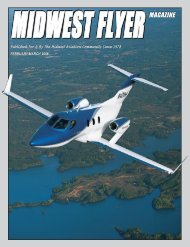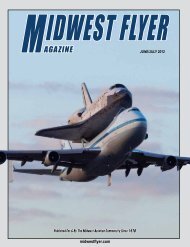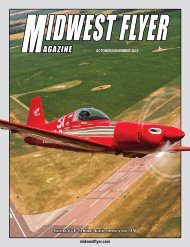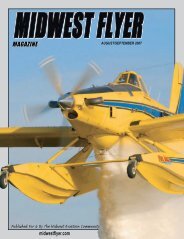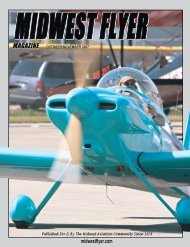AGAZINE - Midwest Flyer
AGAZINE - Midwest Flyer
AGAZINE - Midwest Flyer
You also want an ePaper? Increase the reach of your titles
YUMPU automatically turns print PDFs into web optimized ePapers that Google loves.
Repairing a muddy runway.<br />
humanitarian aid and medical care to people in isolated<br />
villages. Flying small fixed-wing aircraft or helicopters,<br />
they evacuate patients to in-country regional hospitals.<br />
Sybert’s new hinge, complete with a locking mechanism<br />
that engages when the stretcher is unfolded, worked<br />
brilliantly. But then there was the matter of ferrying it,<br />
along with a few spares, to the Hanleys’ base in Tronquera,<br />
Nicaragua. Shipping the hinges was not an option.<br />
Nicaragua is second only to Haiti as the poorest country<br />
in the Western Hemisphere, and corruption is widespread.<br />
Supplies sent from the United States are almost certain to<br />
be “lost” and ransomed. Few travelers are foolhardy enough<br />
to check their luggage on commercial flights into Managua,<br />
the only international airport in the country.<br />
Instead, Wings of Hope made arrangements for<br />
the hinges to hitch a ride in the carry-on baggage of a<br />
missionary who was returning to Nicaragua. He escorted<br />
the package to a regional airport and quietly handed it off to<br />
Hanley as if it were contraband. Hanley loaded the new set<br />
of hinges, along with medicine, radio equipment, and other<br />
supplies, into his plane and headed back to his 3,000-ft.<br />
grass and gravel airstrip on the outskirts of Tronquera.<br />
Hanley, an IFR-rated pilot with 2,000 hours of flight<br />
time, evacuates about two patients a week from villages<br />
hemmed in by marshes and lagoons, rainforest, impassable<br />
roads, and swollen rivers. Injuries often occur in the<br />
continual struggle to subdue this unforgiving terrain. Last<br />
year, for example, a man fell while working on his land,<br />
impaling himself on his own machete. “Friends carried him<br />
back home, put him in a boat, and he traveled the rest of the<br />
day and all through the night to reach the nearest medical<br />
help,” Hanley recalls. “But the doctor realized the man's<br />
injury was far beyond the limited capabilities of his small<br />
clinic.” He summoned Hanley, who arrived in less than an<br />
hour to evacuate the patient, as well as a 14-year-old girl<br />
with a broken foot, speedily conveying them to a regional<br />
hospital.<br />
About half of the patients Hanley transports are women<br />
with complications of pregnancy or childbirth. Recently,<br />
for instance, two women with high-risk pregnancies in the<br />
nearby village of Lapan, went into labor at about the same<br />
time. One was thought to be pregnant with twins. “These<br />
ladies had been carried to the airstrip through a swamp<br />
that’s often knee deep,” Hanley explains. “It took four guys<br />
to carry the larger woman in a hammock suspended from a<br />
board.”<br />
Even in the best circumstances, he says, it’s a 30-minute<br />
slog from the village to the runway. “Some people have<br />
enough money to buy boots to wear, but they fill with mud<br />
and water because they sink in to their knees. The roads are<br />
not passable for several months of the year, and this was<br />
one of those times. But a quick 25-minute flight from their<br />
airstrip, and I had them at the hospital in Puerto Cabezas<br />
[on the Atlantic Coast]. They both delivered healthy babies,<br />
thanks to the medical care they received there.” Without<br />
transport, says Hanley, the mothers, their babies, or both<br />
would have died.<br />
In developing countries, death is not flashy. No reporters<br />
rush to the scene, no code blue is called, and no hunky<br />
resident is there to straddle the patient on a gurney while<br />
thumping out chest compressions. Ordinary, humble people<br />
die stoically of garden-variety illnesses like measles and<br />
asthma. But now and then, their lives are saved with the<br />
help of a few compassionate people, a dependable airplane,<br />
and one very sturdy stretcher.<br />
EDITOR’S NOTE: Melissa Kinsey is a medical writer with<br />
Nicholson & Stillwell (www.nicholsonstillwell.com; melissa.<br />
kinsey@nicholsonstillwell.com; 314-601-3348), and a<br />
volunteer for Wings of Hope (www.wings-of-hope.org). q<br />
Best<br />
Oil Company<br />
AviAtiOn Fuels<br />
& luBriCAnts<br />
-Serving-<br />
Michigan<br />
Minnesota<br />
Wisconsin<br />
1-800-524-4666<br />
AUGUST/SEPTEMBER 2010 MIDWEST FLYER M<strong>AGAZINE</strong> 27


